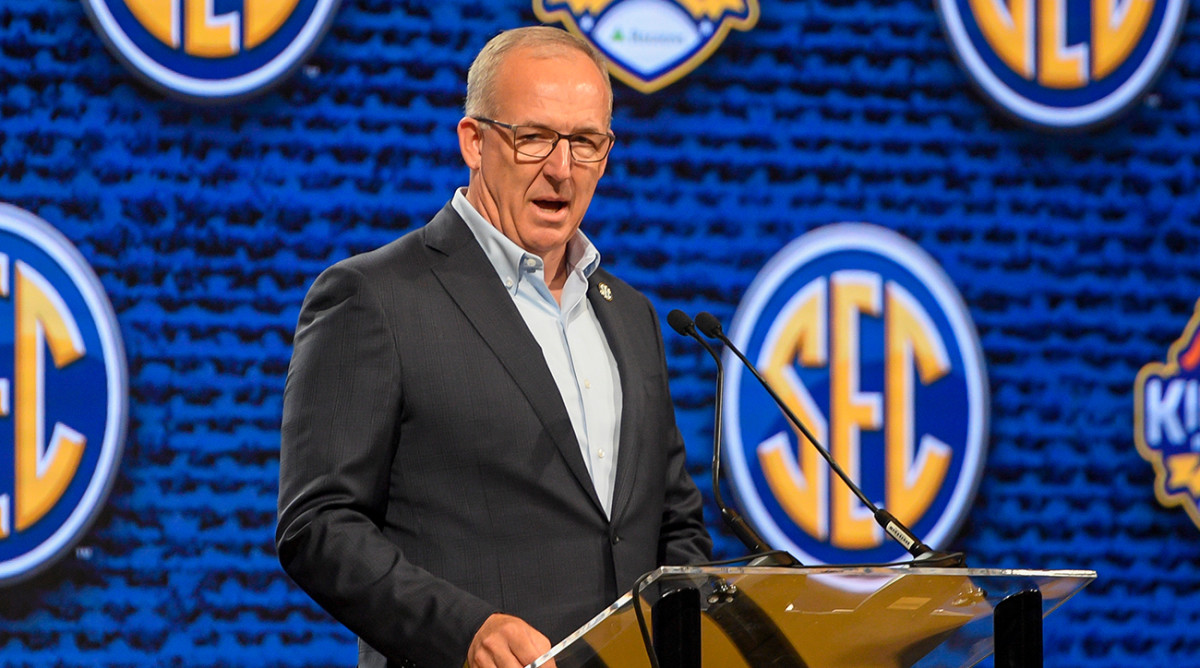SEC Commissioner’s Call for Congress to Regulate NIL Is the Right, and Likely Only, Approach

Greg Sankey continued college athletics’ multipronged offensive for broad-based name, image and likeness (NIL) legislation in Nashville on Monday. The commissioner of the Southeastern Conference opened the league’s media days with an extended treatise on the need for a national policy created by Congress.
While some of the alarmist rhetoric about the threat to the “college sports model” from NIL has been comically overblown in the last two years, Sankey’s point has merit. A little regulation can go a long way without costing athletes much in the exchange.
And that regulation can’t come via the narrow lens of individual states. The current hodgepodge of fanboy self-interest that is passing through statehouses nationwide is not the answer.
In the blanket-law vacuum, state laws are a mixed bag. Some have smart, sensical tenets built into them. But some follow this logic: Let our boosters whip out whatever cash is necessary to recruit players, and in the process supersede—and nullify—whatever NCAA rules might be violated by our guys. Predictably, this has spawned further legislation in other states—altering, or abandoning, laws on the books—due to competitive disadvantage.
Thus the strongest instinct in college football remains a powerful force: terror over a rival gaining any shred of advantage. Operating out of that mindset—every program (and state legislature) for itself in an effort to get a leg up—has never served the industry well. It won’t serve well in a lawmaking capacity, either.

“The reality is our student-athletes deserve something better than a patchwork of state laws that support their name, image and likeness activities, if support is the right word,” Sankey said. “Our student-athletes deserve something better than a race to the bottom at the state legislature level. As the efforts are made to create what are perceived as a competitive edge through state laws that are not overseen.”
Thus, the thinking goes, take it national and try to create something that is (A) uniform, (B) enforceable and (C) semi-fair, while (D) not selling Olympic sports down the river. It’s something of a Hail Mary play, but it’s also the only option in a threadbare playbook at the moment.
Unfortunately for Sankey, NCAA president Charlie Baker and many others pushing for national legislation, Congress doesn’t seem ready, willing or able to get it done. Various bills have been proposed, but getting to the point of coalescing around one specific plan seems difficult. That difficulty will ratchet up in a few months, when many of the nation’s lawmakers fixate on getting themselves reelected.
So we’ll see where this goes. But college athletics is not served well by a landscape in which states try to strong-arm their way through a system that needs an NCAA governance structure.
A Knoxville News-Sentinel weekend story revealed what had been rumored in April: Before Tennessee’s hearing in front of the NCAA Committee on Infractions to answer for “hundreds” of rules violations, the state attorney general was threatening to sue if the Volunteers were given a postseason ban.
Attorney General Jonathan Skrmetti’s shot across the bow to the NCAA came in the form of a letter. It asserted that a postseason ban would inhibit Tennessee players’ NIL opportunities—which would run counter to state law.
“I will not hesitate to vindicate the rights of UT students to enjoy the full measure of their intercollegiate athletic opportunities,” Skrmetti wrote in the obtained letter. “NCAA rules cannot supersede Tennessee law.”
Whether or not the threatened lawsuit was a factor, the Volunteers escaped a postseason ban. But the NCAA ruling, in the face of what the Committee on Infractions described as “one of the worst” cases it has ever gotten, essentially killed the postseason ban. We won’t see it again.
Suffice to say, the attorney general was taking a wide berth with his stance. How many NIL opportunities are dependent upon bowl participation is open to significant debate. (As opposed to, say, being a five-star recruit paid up front to sign a letter of intent.)
But beyond the underpinning of the legal argument is the fact that there is a legal argument at all. The state of Tennessee, and other states, shouldn’t have the authority to strike down NCAA bylaws.
The association is the world’s easiest target, hopelessly entangled in its own bureaucratic density, still trying to modernize after decades of obstructing fair progress. But NCAA member schools are exactly that—voluntarily joining under its umbrella and, in the process, agreeing to play by its rules. A school that tries to be an NCAA member and also lobby its state legislature for protection from those membership bylaws is over-reaching.
But this is where we are in big-time college athletics. Which is why there is a need for something that regulates agents and establishes a level of uniformity in the NIL space. Something that allows the NCAA membership to set its desired rules and enforce them.
Asking Congress for that bailout seems like a long shot. But it’s currently the only shot, and Greg Sankey fired it Monday for a reason.
